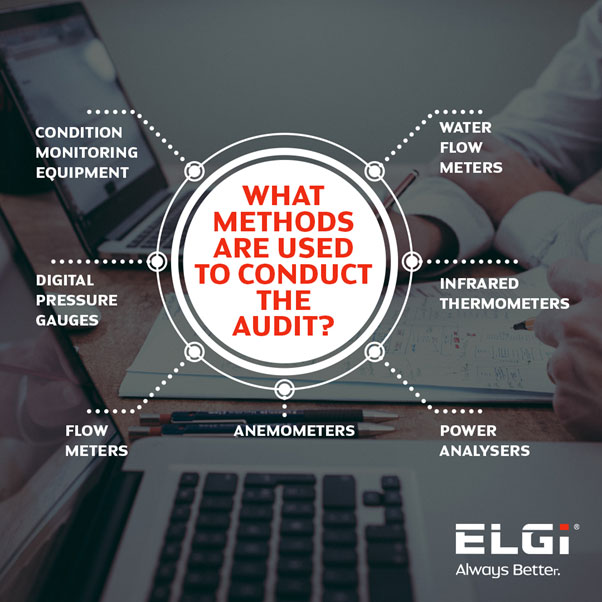A compressed air audit serves as a complete assessment of a compressed air system, meticulously examining its components, operation, and energy consumption patterns. Through detailed measurements, technical analysis, and air leakage management plans, the audit aims to pinpoint inefficiencies and propose tailored solutions to enhance system performance. Businesses can achieve significant cost savings and enhance sustainability by identifying energy-saving opportunities such as optimising compressor operations, reducing air leaks, and improving maintenance practices. Ultimately, a well-executed compressed air audit ensures that the system operates at peak efficiency, contributing to operational reliability and environmental responsibility.
Our Audit Report includes recommendations on short, medium, and long-term measures for energy conservation, along with financial estimates and analysis for their implementation. These recommendations come with databases and fact sheets generated by conducting measurements and tests in your plant and the field. In addition, we offer assistance in implementing and performance monitoring of our energy conservation proposals which is achieved by the expert services of our engineers and the training of the user’s operators.
With increasing energy costs, the performance and efficiency of your compressed air systems have never been more critical. Potential energy savings reduce your business's conservational impact and bottom line. We help you reduce power consumption and compressed air system load, consumables and wear and tear, extending the lifetime of the entire compressed air system.
Compressed Air System Energy Audit
- Total systems scientific approach.
- Demand-side flow analysis [end use].
- Supply-side flow optimisation.
- Full measurement of power consumption including power factor.
- Actual flow, pressure & power requirements.
- Quality of the compressed air & dew point [where relevant].
Compressed Air Leak Audit
Air Leakage Management Plan
- Air leakage recognition, quantification and costing.
- Air leakage correction recommendations.
- Air leakage tracking [data management for repeat surveys].
- Targeting of maintenance up grades.
Detailed Measurement & Technical Analysis:
- Flow demand classification and optimisation
- Compressed air system distribution
- Possibility verification
- Cost savings analyses
- Recommendations and conclusions
- Continued plan to reduce energy costs
Energy is a valuable resource, and compressed air is an expensive utility that finds application in a wide range of processes across various industries. Therefore, the prudent, careful, and energy-efficient use of compressed air is vital as it affects the viability of any processing activity. With over 60 years of research and innovation in air compressors, instrumentation, and services, ELGi offers compressed air solutions for every need. Our proven expertise in these fields has enabled us to accurately understand compressed air consuming activities, pioneer techniques, and equipment for auditing energy consumption. Our team of expert mechanics, electrical, and instrumentation engineers conducts the audit surveys and trains end-users in key energy-oriented functional areas to ensure that energy is utilised most efficiently.
Compressed air energy audit is a specialised process; it takes thorough knowledge and expertise in multiple fields to estimate, design, commission and undertake performance monitoring of projects for energy conservation.
Targets of Energy Audit of Compressed Air System
- Assessing the overall energy consumption of the compressed air system and identifying opportunities to reduce energy usage through efficient equipment operation, load management, and system optimisation.
- Ensuring the compressed air meets quality standards for its intended applications, minimising contaminants, and improving filtration and drying processes where necessary.
- Evaluating the reliability of equipment, identifying potential failures, and implementing maintenance practices to enhance system uptime and reduce downtime costs
- Identifying cost-effective measures to reduce operational costs associated with compressed air generation, distribution, and usage.
- Addressing sustainability goals by reducing carbon footprint, optimising energy efficiency, and minimising waste in compressed air operations.
Benefits of Compressed Air Audits
- Energy Savings: By optimising system efficiency, reducing air leaks, and improving control strategies, significant energy savings can be achieved.
- Cost Reduction: Lowering energy consumption leads to reduced operational costs and improved financial performance.
- Improved Productivity: Ensuring reliable air supply for critical processes enhances overall productivity and operational efficiency.
- Compliance & Safety: Meeting regulatory requirements and enhancing workplace safety by improving air quality and system reliability.
- Sustainability: Contributing to environmental sustainability goals by reducing greenhouse gas emissions and energy consumption.
We enable energy-intensive industries with efficient utility consumption and management, helping with a drastic reduction in electricity bills to make your operations more competitive and increase productivity and overall profitability

INTERESTED IN OUR
SERVICES & PARTS?
If you are interested in our extensive range of services and parts, click below.
SERVICE REQUEST
; ?>/images/mobile/nav-down-arrow.png)
